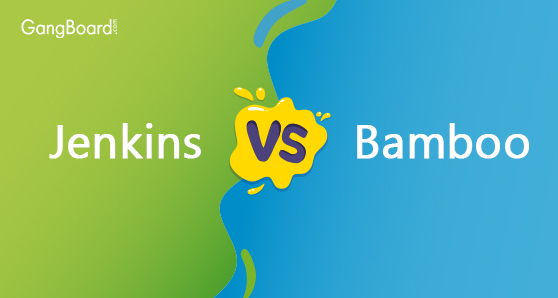
Jenkins Vs Bamboo
Jenkins Vs Bamboo – Comparison of Top CI/CD Tools
Efforts have been made to inject automation in every possible aspect of life to obtain maximum desired results with minimum resources and time. Software deployment industry is also no different. But as with the advent of more and more tools, the problem of choice arises which needs proper evaluation for optimum results. In this article, we are going to take a look at factors correlating to Jenkins vs Bamboo software.
Atlassian Bamboo and Jenkins are the two most commonly heard continuous integration continuous delivery (CI/CD) tools in the industry and as they share many common peculiarities, the choice of the tool creates great confusion for the service seekers. They both convert the long, time-consuming and hand-operated task of extending a software into an easier, faster and automated one, also known as agile development.
The following article takes a deep look into both the service providers for making you aware of all the necessary information and make a better choice.
What Is Jenkins?
Being one of the most popular CI/CD tools on the market, Jenkins is used for building, testing, and deploying code to facilitate faster software development. It is open-source and hence is more desirable for newbies to get accustomed to continuous integration as it is pretty simple to use.
As a result, Jenkins makes it easier for developers to resolve bugs. It does not matter what number of languages are being used for development. Earlier, Jenkins was made just to function with Java-based applications, nevertheless, it currently supports a large number of languages along with a massive collection of 1400+ plugins.
What Is Atlassian Bamboo?
Atlassian Bamboo is a paid continuous integration tool that charges based on the number of user agents used. Although it is not an open-source CI/CD tool, it offers power-packed performance as it is specially designed to work parallelly on multiple threads. Therefore, if you need to work on multiple versions of the same software at once, Atlassian Bamboo is your guy.
You will learn more about these CI/CD tools in our Bamboo vs Jenkins article.
Key Differences Between Jenkins and Bamboo
Parameters |
Jenkins |
Bamboo |
| Open Source | Yes | No |
| Pricing | Free | Priced |
| Plugins | Plenty | Fewer |
| Support Community | Large | Small |
| Upgrade | Easy | Tricky |
| Backup | Tricky | Easy |
| Git branching workflows | No | Yes |
| Built-in Deployment Projects | No | Yes |
| Test Automation | Yes, with plugins | Yes, built-in |
| Support for distributed builds | Remote Nodes | Remote Agents |
| Operating System | Windows, Red Hat, Ubuntu, Mac | Windows, Solaris, Linux |
| Supported Browsers | Google Chrome, Mozilla Firefox, Internet Explorer | Mozilla Firefox, Chrome, Edge, Safari |
| Built-in Integration for Jira | No | Yes |
| Built-in Integration for Bitbucket Server | No | Yes |
| REST APIs | Yes | Yes |
In-depth Comparison of Both the Continuous Integration Tools
Open Source
One of the major difference between Jenkins and Bamboo Atlassian is that while Jenkins is an open-source tool, Bamboo is not. Therefore, Bamboo continuous integration tool charges money based on the user agent that will require to support your software. Therefore, it can get pretty costly if you are working a high-end project with multiple versions and threads.
Price
While Jenkins is totally free of cost Atlassian charges a whopping amount of money when it comes to the Bamboo CI/CD tool. The initial charges are fairly low, i.e., $10, however, this rapidly goes up and transforms into a whopping $880 a year and that too for a single user agent.
User Community
Due to the obvious reasons such as being free and open-source, the user community of Jenkins seems to be far ahead than that of its competitors, such as Bamboo continuous integration tool. This is an important aspect to consider while looking at Bamboo vs Jenkins as CI/CD tools.
Having a larger user community can be an added advantage to look out for various upgrades, updates, and bugs. However, although the solution might be there, you will have to surf through an extensive number of threads in order to discover how to solve a problem as you are on your own.
On the other hand, Bamboo CI tool comes with professional support from the parent company making at a completely user-friendly and tailor-crafted experience.
Plugins
Another major benefit of using Jenkins against Bamboo is the number of plugins supported by Jenkins. As Jenkins is an open-source and popular tool, it has an enormous library of plugins needed for any task.
Although Jenkins was first developed to function for Java applications only, Jenkins now supports multiple platforms and has grown with a library of over 1400 plugins. These plugins allow you to easily customize and extend the functionalities of Jenkins. Here, Jenkins clearly outperforms Bamboo in Bamboo vs Jenkins comparison.
On the other hand, the Bamboo continuous integration ecosystem is increasing as well, however, the expansion seems to be at a slower pace as of now, which can possibly hinder the user. Nevertheless, here the plugins are crafted at an absolute level and are tend to be bug-free.
Cloud Support
It is an added advantage to work on cloud-based software when dealing with a large number of users for better convenience and effectiveness. However, Atlassian stopped providing support for Bamboo Cloud, hence, the Bamboo tool server resides on the local system being a little vulnerable. On the other hand, Jenkins still runs on the cloud server.
Setup Complexity
Here, the clear winner in terms of ease of setup is bamboo software when comparing Jenkins vs Bamboo. Bamboo has easy to use user-interface. Therefore, accessing and utilizing each function becomes pretty easy without wasting much of your time.
Jenkins, on the other hand, is fairly complex. Neither does it have a pretty user-interface nor it is convenient in terms of utilization. Here, you will have to constantly teach yourself how to make use of different functions when it comes to Jenkins. Making it a DIY kind of continuous integration software. However, this seems appropriate for an open-source tool.
Other Features
Comparing Bamboo vs Jenkins, a great feature of Bamboo is that it can easily integrate with other Atlassian software such as Atlassian JIRA and Bitbucket server integration.
While Jenkins also supports integration with JIRA and Bitbucket thanks to its wide range of plugins. However, the integration is obviously limited compared to that of the Bamboo test automation tool. Moreover, it can be pretty time consuming to integrate Jenkins with Atlassian software as well. This can be pretty inconvenient if you own a large business and cannot tolerate wasting man hours.
Top Features of Bamboo
- It is owned and supported by Atlassian, therefore, there are more frequent bug-fixes and other updates.
- Bamboo framework easily integrates with Atlassian JIRA and Bitbucket.
- Atlassian Bamboo allows you to easily scale up with multiple user agent support. Further, it comes with a powerful user agent matrix support system that helps you visualize better.
- All the documentation is well-maintained and updated.
- Professional support if you ever face any trouble, which is absent in case of Jenkins.
- Great for large software systems with various build versions.
- Built-in testing and deployment support.
- Bamboo also features well-crafted plugins.
- Pipeline chaining is possible.
- Bamboo automatically detects and builds new branches.
- Bamboo also facilitates quick import from Jenkins for those migrating to a new CI tool.
Top Reasons to Choose Jenkins
- Jenkins is the most sought-after continuous integration / continuous delivery tool.
- It is an open source continuous integration tool.
- The biggest benefit of using Jenkins is for those on a tight budget and looking to automize their process without spending much money on their standalone systems.
- It has an enormous library of 1400+ support plugins.
- The large user community of Jenkins allows you to easily find solutions to similar problems.
- Jenkins allows you to run the system on a cloud server.
The EndNote
While Atlassian Bamboo offers professional support and management, Jenkins thrives on its enormous and supportive user community. Bamboo CI comes with great easy to use interface with powerful features and simple integration with JIRA and Bitbucket. On the other hand, Jenkins makes use of 1400+ plugins to deal with many of the functionalities. Moreover, while Bamboo is the perfect choice for large software systems with multiple versions, Jenkins is great for simple standalone systems. Also, keep in mind that Bamboo charges greatly for the service provided while Jenkins is totally free.
In a word, comparing Jenkins vs Bamboo, we would say Bamboo is a great CI/CD tool for those running complex software and have a stretchable budget. But for those starting out with automation and having a tight budget should surely opt for Jenkins.


 +1 201-949-7520
+1 201-949-7520 +91-9707 240 250
+91-9707 240 250